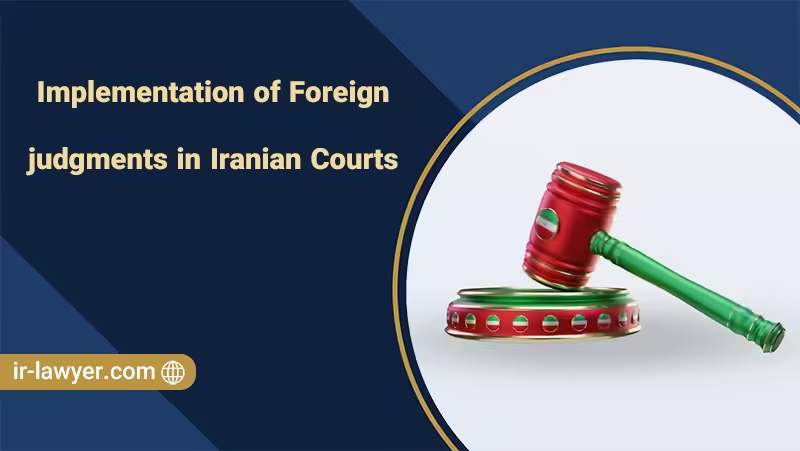dear user
I am Khalil Asayesh ( iranian lawyer from the Tehran Bar Association with license number 21129) Thank you for choosing my site to use legal services. We would like to inform you that this site has been set up with the aim of improving the level of legal information, legal advice and solving problems of domestic and international law.
My specialty is in the field of international companies and contracts, I have experience in advocacy in international arbitration, as well as experience in enforcing foreign judgments in Iranian courts and courts outside Iran (including Germany, France, Turkey, UAE.and Oman), so I am ready to provide you with legal services in this regard.
Telephone contact and whats app numbers:
09124439719 Iran
00971521583759 United Arab Emirates ( whats app)
“We are not responsible for holidays and non-working hours”
The Obstacles to The Implementation of Foreign judgments in Iranian Courts
Considering that the provisions of the sentence are the responsibility of the judge who issued the order to be executed, this requires the court to comment on the nature of the sentence, and if there are circumstances that will be examined below, the order will be given to the non-implementation of the sentence, and that the sentence be identified.
The obstaclesto the implementation of the mahavi are: 1- The principle of public order: Whenever the implementation of the sentence issued by the foreign court damages the public order of the country where the execution is carried out, as an indisputable legal rule, such a sentence cannot becarried out. Farideh Shokri, 2013, pp. 38-39. Authors disagree with this interpretation. Because the implementation of the sentence is in the stage of the effect of the right, not the creation of the right, so here the mild effect of public order is examined and explored, and it is in the stage of creating the right that we face severe effect. This condition is also stipulated in paragraph 2 of Article 169 of the Islamic Republic of Iran, Article 972 of the Islamic Republic of Iran and Article 6 of the Civil Procedure Code. The concept of public order has been considered since the 19th century, because it was in this century that the drafting of laws in most European countries intensified the dispute between laws and rights of countries and increased the citation of public order. Since the 19th century, French judicial procedures have taken into consideration public order in cases such as the divorce of foreigners before 1884 and the proof of illegitimate ancestry before 1912, and has refused to enforce foreign law. Article 975 of the Civil Code of Iran, article 30 of the German Civil Code, article 21 of the Italian Civil Code, also stipulates public order. However, the concept of public order varies in domestic law and private international law:
Public order in domestic law: In domestic law, public order includes organizations and rules that are intended to protect the public interest and provide good flow and family preservation, and the will of individuals is not in violation of this. In other words, public order includes the rules of the matter.
Public order in private international law or public order in the limited sense: public order in private international law cannot be generally observed by all the rules of affairs of countries.There is a solution to implementation in all countries. but the circle of public order is different from mine.
The concept of public order is a relative concept and has its own meaning in each country. Today, the public order has lost its past and its concept has been amended, for example, in paragraph 5 of Article 1502 of the French Civil Procedure Code, the term domestic public order has been changed and used to international public order. (Khazaei, 1992,p. 53.) Therefore, the realm of public order has been reduced.
2- Voter education fraud: Another obstacle to the implementation of the sentence issued by the Foreign Court is the fraud of the vote education. This is rooted even in domestic law, and according to paragraphs 5 and 6 of Article 426 of the Civil Procedure Code, it is the cause of the restitution of the other party’s fraud.
Of course, the condition of this restitution is that this fraud was effective in the court order. It is also a case where the court’s ruling is documented in documents that have been proved to be forged after the verdict. But what does it mean to be cheating internationally? Voluntary change of certain elements of communication by legal ways with the intention of escaping and ignoring the competent law that normally applies to him and the use of the jurisdiction of a more lucrative jurisdiction for his own purposes.
The issue of law-rigging in France was first raised in the 19th century. Ms. de Bofferman, who was a French citizen and married to the Frenchman, wanted a divorce in France and a divorce from studying German citizenship. And he wanted to marry the Romanian man in Berlin, which confirmed the lack of credibility of the vote in France.
Now the question is that in all legal systems of the world, the issue of fraud is one of the extraordinary ways of complaining about definitive rulings, should the claimant of the fraud in education signify the verdict for retrial to the country of the issuer of the sentence, or is it possible to grant the convicted person against the possibility of a complaint?
The proceedings are possible in the country where the verdict is issued, it is appropriate that the court issued the order not to enter into the investigation of the issue of fraud in the study of the vote, and until this issue is addressed in accordance with the provisions of the national law where the verdict is issued, the principle of the validity of the documents of the sentence will be implemented. In contrast to the judicial procedures of many countries, it tends to believe that the court where the execution order is issued will investigate the fraud claim and refuse to carry out the sentence if the documents are stated to be in the form of other fraudulent means.
3- The ruling on immovable property located in Iran and its rights. This condition is one of the obstacles to the implementation of foreign sentences, including the examples of paragraph 6 of Article 169 of the Civil Code. As prescribed in Article 12 of the Civil Procedure Code, claims relating to immovable property, including property claims, harassment, denial of right, etc. In court, the place where immovable property occurs is dealt with. Naturally, if the property is immovable in Iran, the external ruling on it is ineffective. Of course, today, the discussion of protection policies of immovable property has lost its holiity and these properties and the rights arising from it are not preferred over other properties. Because the taste of ownership has changed and the existence of modern cars and villas is not less than other immovable property.




